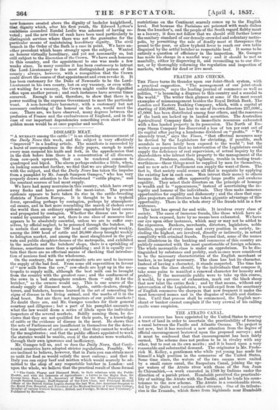FRAUDS AND CHECKS.
THE Times turns its thunder upon our Joint-Stock system, with a practical suggestion. "The management of our joint-stock establishments," says the leading journal of commerce as well as politics, "is becoming a disgrace to this country and a scandal to the world." The writer then glances at some of the most recent examples of mismanagement besides the Royal British Bank. The London and Eastern Banking Company, which, with a capital at starting of 250,000/., has lent to one of its own directors 237,0001., 47,000/. has been distributed among four others, and the resources of the bank are locked up in landed securities. The Australian Agricultural Company finds its immediate resources exhausted with a fine landed property in its possession. The North of Europe Steam Company has discovered a loss of ten per cent out of its capital after paying a handsome dividend on "profits." "We sincerely truSt,r says the Times, "that effectual measures may be devised by the Legislature for obviating, if possible, such scandals as have lately been exposed to the world "; but the writer soon perceives that no intervention of the Legislature could supply the deficiency of real supervision, of actual inquiry by the shareholders who intrust their property to the management of the directors. Prudence, caution, vigilance, trouble in testing trustworthiness—these things must be supplied by men for themselves, and no new acts of Parliament can supply the want of them. The fact is, that society could secure all that is requisite by applying the existing law in each case. Men intrust their money to others because the scheme offers apparently large profits and awakens cupidity-. They select their directors on the principle of homage to wealth and to "appearances," instead of ascertaining the integrity and honour of the individuals. They thus make immense opportunities for cupidity and dishonesty ; and the class that supplies projectors and directors has taken gigantic advantage of this opportunity. There is the whole story of the frauds told in a few sentences.
The taint has spread far and wide. It involves every class of society. The cases of immense frauds, like those which have already been exposed, have by no means been exhausted. We have our eye upon other instances, which may or may not be added to the exposures. Bankers, merchants, directors, legislators, noble families, people of every class and every position in society, including the highest, are involved, directly or indirectly, in actual complicity with criminal frauds. Beyond that, some of the names most illustrious in the banking and commerce of this country are publicly connected with the most questionable of foreign schemes. The whole mercantile class is under an opprobrium. To be distinguished by substance and probity, such as once were considered to be the necessary characteristics of the English merchant or banker, is no longer necessary. The class has lost its character. Instead of having a character, it stands suspected. The time has come when the class should, by the individuals that compose it, take some pains to manifest a renewed character for honesty and probity. If the mercantile public were to take up this course, it would, by a process of exhaustion, mark out the black sheep that now taint the entire flock ; and by that means, without any intervention of the Legislature, it would expel from the sanctuary of English commerce the sharpers that now frequent it under the most honoured names and in the disguise of wealth and distinction. Until that process shall be commenced, the English merchant or banker cannot complain if the very avowal of his calling excite some suspicion.


































 Previous page
Previous page